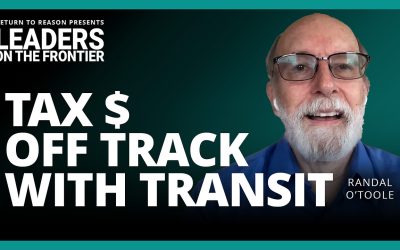Frontier Centre: The first question is broadly, what is cabotage?
Stephen Blank: Cabotage would be first the transport of goods within the same country and also at the same time to restrictions on the transport of goods within the same country usually insisting that a national from that country do this. So it means both things. It is in simple terms a non-tariff trade barrier.
FC: What is the impact of cabotage regulations on the Canadian economy?
SB: Inhibiting cross border integration with the United States and with Mexico makes the economy generally less efficient and raises costs. It’s a trade barrier that is found in many places and it makes things move less efficiently, raises the costs, and it increases environmental load because you are running more empty vehicles around.
FC: How do ordinary consumers feel the effects of cabotage regulations?
SB: They don’t. Because what you’re finding is as things as these costs are spread out so widely it’s very hard to say this is the cabotage tax. Everything is a bit more expensive and those costs tend to be eaten or transferred in a whole variety of ways. So that’s one of the reasons it’s hard to get people roused about cabotage. You can’t say here’s the cabotage tax. Also, whenever there is greater complexity there will be organizations and individuals who make their living dealing with the complexity. There are a set number of people who find this the more complicated the law the more lawyers have work. You also find people who benefit from this.
FC: What’s the rational for the current cabotage regulations?
SB: The primary rational across the board is jobs. That may not be meaningful really. We have no sense of a vision of a more integrated, sustainable, efficient, North American economy against which to balance the current. So if people say jobs, its jobs but if we say “yeah but if we didn’t have this you might have more jobs created in other industries” — that’s not a dialogue, a conversation we have ever tried to instigate. The other thing is that wherever you have a trade barrier like this the benefits received from freer trade are wide and shallow, the benefits received from the trade barrier are often sharper and deeper so some people get a lot out of this at the cost of very little to a lot of people. So it’s very hard to arouse feelings about this.
FC: Concentrated benefits and dispersed costs?
SB: That’s exactly it.
FC: Are cabotage regulations out of line with international practices?
SB: That’s an interesting question. Certainly with what is going on with regard to the European community. From the very beginning the Europeans were determined to develop a common transport policy. That included dealing with cabotage issues. My sense is the Europeans, though they have not been entirely successful they are far, far more advanced than we are in this.
FC: What are some specific changes we can make to our cabotage regulations?
SB: You can approach this in two directions. One is continue industry by industry, small steps. The fact is that over the last years there have been some significant changes. The Canadian governments changed how they deal with marine containers, harmonizing more with the U.S. This isn’t eliminating cabotage but it makes it easier on the Canadian side and increases integration. The steps forward on air – also not specifically to do with cabotage – include making pre-clearance more efficient.
Second, begin to develop a vision of what a North American freight transportation system for the 21st century might look like. Maybe you do both at the same time. What we have found is moving forward incrementally you run into barriers. The Canadian government, U.S. government, Mexican government really not prepared to confront a NA air regime. The three countries are not prepared to commit and confront North American short sea shipping. I think one of the reasons is no one wants to go that far on thin ice unless you have a sense of where you are going. You could keep pushing on industry by industry — there are gains that could be made. But the big gains will not be made until we have a broader sense of what a North American freight transportation system ought to look like or might look like.
FC: How do cabotage regulations alter the logistics of North American transportation because there are various different ways of transporting freight and passengers?
SB: The obvious answer to that is you have a lot more empty trucks than you should have. You have a lot more complicated movement of stuff than you should have. On the other hand being realistic it also means that systems have responded to this with various work-arounds to have made the system work. I don’t know enough — I don’t know if anyone does. You have lots more empty trucks you have lots more expense. Look at Bison saying all the money they spend per month moving containers and rigs around. And yet for the most part or to a certain extent some of that will be alleviated through various work-arounds, making and doing amending, muddling through, you know, figuring it out. I don’t quite know the answer.
FC: What about other industries that are affected, such as maritime shipping and so forth?
SB: We do things very differently. A foreign ship will come into Halifax, drop off boxes, drop them off in New York all the way down to Savannah, turn around and pick them up again on the way out, and that’s the way you do it. Is that better than going city to city load and unload? I don’t really know. The kind of short sea shipping that one might imagine with say Halifax becoming a major mega-port for giant container ships, dropping them off there and then doing short hauls. You don’t really want them back and forthing as shuttles. Again I don’t know. We have worked around that. Air, would it be better if our system worked more like the European where the airline treats it as a single unit. But obviously that’s the way we do it. How much better would it be, how much savings? There may be papers on this but I don’t know the numbers.
FC: Is there any downside to eliminating restrictions on cabotage?
SB: Sure. The people who benefit from them will have losses and this is probably not an insignificant amount of people. If you make your life as a lawyer dealing with these issues, that would be an issue. If you open the border entirely, much more without the security stuff, the various companies that specialize in helping you do the work would not have to do it. If you open the U.S./Mexican border for trucking and you eliminate cabotage requirements, your big Mexican truckers couldn’t go across the border you wouldn’t need the guys who haul the stuff, from one side of the border to the other. So there would be lots of people who would be injured by this. Some people would have big losses, no question.
FC: Is there an organized effort from any group, industry, political lobby to prevent reform currently?
SB: Oh sure. In each industry. Take shipping for example. There is a whole array of American ship builders, unions, different groups who desperately don’t want to change the Jones Act. I think across the board there are probably tons of people in all three countries that do not want to see an integrated North American aviation system. Obviously there are always people who don’t want to have an invested interest in the existing system. Because the reform of cabotage is not a big public issue, this is really fought out more in the hallways of congress or in Ottawa than it is in public.
FC: Is reform likely within the current political context?
SB: No. Indeed the current political context given the slow recovery from the recession we’ll be lucky if we don’t see a pullback from some of the gains that have been made previous in terms of integration. When people talk about a Canadian energy strategy or U.S. energy independence these are dangerous signals. It was very, very good I thought when both Romney and Obama in the debates talked about a North American energy strategy. That word had never been used before at that level. But the Canadians keep talking about a Canadian energy strategy. As you move into uncertain and tougher times the instinct is gonna be to pull up the drawbridge a bit. Without that vision, of the alternative, of how these 3 countries could benefit significantly by more integration by better transportation policy. The danger is more that we inch backwards then it would be to go ahead.
FC: Within the context of Canadian politics strategically moving forward, how could the Canadian government make some headway on this? Do you see any way that they could create an issue out of this and make some political progress?
SB: Sure, but I think the notion that this has to come from the government is the wrong way to go. I think there have to be voices, much broader voices. It’s crazy that in the transportation community here that there is no focus on North America. That’s just bizarre. While I have great affection for some of the things done by the Canadian Chamber of Commerce, we need a U.S./Canada Chamber or U.S./Canada voice. I think about what the old Canada/U.S. committee did before the run up to the free trade agreement on producing and distributing information pretty widely and there’s nothing like that. I mean it’s just unbelievable. We need the signal from the top but we also need the push from the bottom. I think the best thing the government could do now is not talk about major policies but to build up an informed constituency maybe to create a North American transportation commission but to encourage the existing research centers to use some of their assets to look more at this. We need more collaboration at the universities across the board. This very basic building stuff because we can’t build on ignorance and we have got a lot of ignorance.
FC: So what we are really missing is ideas?
SB: We’re missing the informed constituency. You need to have a lot of people understand how this stuff works. We need realistic discussions every time we talk about cabotage and maritime. We can’t say the U.S. will be defenseless without a fleet, I mean that is just bizarre. What are the benefits to be gained? Why do these things only come up in moments of stress? People should be aware of what we do in North America, and why transportation is valuable to all of us. Then you could discuss these issues more realistically.
FC: Thanks a lot. It was a pleasure.
View as PDF (2 Pages)



